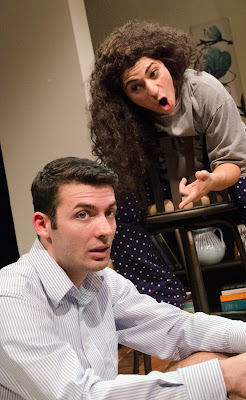 |
| Ben Phillips and Anna Kasaybyan in Bad Jews (Paul Bestock) |
Bad Jews
Seattle Public Theater
Through October 25, 2015
Bad Jews, by
Joshua Harmon, on stage now at Seattle Public Theater, is a very personal and
mixed bag experience for me. Jews are a teeny, tiny minority in Seattle and are
often completely overlooked, but Jews have a deep infiltration of theater in
this country (and of course were seminal in the creation of the Hollywood
machine), so there is perhaps an outsized connection to Judaism in theater.
Shana Bestock,
director and artistic director of SPT, wrote an also personal and mixed-emotion
note about this play and her own Jewish identity, so the play seems to hit many
different notes for her, too. I often find myself worried about the execution
of a play in Seattle, where so many don’t hear the specific cadences of Jewish
vocal delivery, and sometimes very funny Jewish plays don’t land any jokes
because their rhythms are totally misplaced.
This is a 90-minute, real-time play about three cousins,
just after their beloved grandfather’s funeral, two of whom want a “chai” – a
gold-form Hebrew word for “life” – that has special meaning for both. They
converge at a one-room apartment in New York with one cousin’s girlfriend, and
have the fight of their lives.
There are areas where this production lands gorgeously! The
performance of Anna Kasaybyan (as Daphna),
in particular, is spectacularly real, funny, and palpably passionate. Her
innate understanding of where the emphases are is completely note-perfect.
Therefore, she is marvelously funny, while being vitriolicly loud.
The play is definitely funny. Sometimes it’s because of
laughing at Jewish notions and embedded culture (for those who “get” that
stuff) and sometimes because you have to laugh at the meanness the cousins
display, and sometimes at the clueless though well-meaning “shiksa”
(non-Jewish) girlfriend.
But there are many layers to unpack for everyone. Everyone
has some kind of family culture. And there is a tendency in American
melting-pot life to erase cultural “otherness” and look at 2nd and 3rd
generations as simply “American.” This is the viewpoint of Melody (Molli Corcoran), the girlfriend who
states that her background is just “American.” She barely even remembers where
her family came from, and gets a big laugh when asked that and she replies,
“Delaware.”
The fight over the jewelry transcends a family squabble and
becomes a contest in who might be the better Jew. Who is more connected to the
family heritage? Who “deserves” this emotionally-laden, one of a kind, piece of
jewelry? And in addition, should we proudly maintain our familial cultures or
abandon them to the past?
There is a third cousin onstage, Jonah (Ben Phillips), who barely says anything, but is completely
necessary. He is brother to the chai-desiring Liam (Ian Bond), and doesn’t seem to want very much aside from staying
out of the whole argument. Phillips’ facial expressions and avoidance are
perfectly expressed for a shy and anger-averse man. The reveal at the end
involving him is what brings the play to the next level.
Corcoran also feels note-perfect in her befuddled and
careful responses to the family dynamic. Daphna castigates her and casts doubt
on Melody’s intellect, but Melody holds her own and stays true to herself.
While most aspects of the play feel true to life, the
casting of Bond as Liam is a huge misstep. Bond is a fine actor and does his
best, but there is no way anyone can mistake him for any kind of Jew. Watching him
as Liam means that we have to work inordinately hard to accept him saying the
lines, and it pushes us out of investing in the role into just hearing the
words the playwright wrote. I have seen Bond in other roles and really do like
his work. It may have come down to “who is available” for Bestock, but I wish
she could have cast someone more closely resembling Phillips.
There is a feeling that Harmon’s script doesn’t quite punch
hard enough and that some elephants in the room are not tackled. For me, I felt
like the elephant of the Holocaust was so present, but not integrated enough. I
want to discuss that at length here, but I feel like that will overpower the
point of a review. I encourage you to see the play and then communicate with me
about that elephant or any others you feel were untackled. But do see this
dark, funny, powerful play!
No comments:
Post a Comment
This is a moderated comment section. Any comment can be deleted if the moderator feels that basic civility standards are not being met. Disagreements, however, if respectfully stated, are certainly welcome. Just keep the discussion intelligent and relatively kind.